Kate Winslet on Ammonite, Covid, sex, #MeToo and Woody Allen
Kate Winslet, ahead of the release of her new film, opens up about some hot topics.
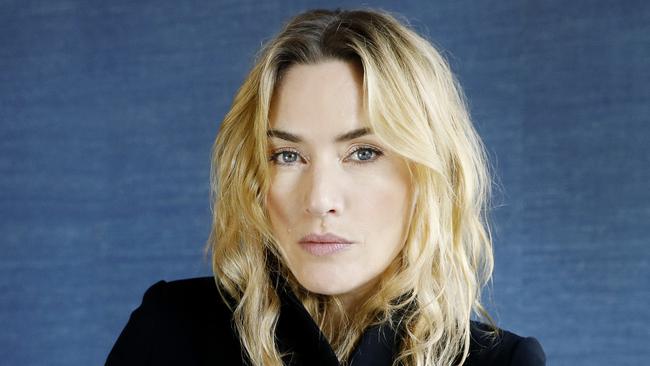
Like the “emotionally stunted” fossil hunter she portrays in her latest film, Ammonite, Kate Winslet has lived a relatively isolated life in recent months.
The Oscar and Emmy award-winning actress is based on the south coast of England and tells Review that because of the country’s high rate of COVID-19 infections she hasn’t visited London all year, apart from one appointment in August. Our interview takes place in December and she is due to visit the English capital the following day for a medical appointment.
“I am dreading it,” she says candidly. “I will wear a mask, I will wear a face shield and people will look at me like I’m crazy ’cause not everyone’s doing that, but they should be, because London’s pretty much moving into tier three (social distancing restrictions). It’s still really bad here, it’s still really bad because we never closed our borders. If had we closed our borders, we would have been just fine, but no leader decided to do that.”
Winslet opens the interview with a question about Australia’s success to date in containing the pandemic: “You don’t really have COVID any more?” she asks, sounding wistful. I explain that, as we speak, most of the cases are among returned travellers in hotel quarantine. (Days later a worrying cluster erupts on Sydney’s northern beaches.)
She is impressed by Australia’s anti-COVID strategy, murmuring, “Wow, amazing”. Nonetheless, there is an undertone of anxiety in that commanding, resonant voice so familiar from her performances in high-profile movies Titanic, The Reader, Revolutionary Road and the blue-chip television miniseries Mildred Pierce.
A three-time BAFTA award winner, Winslet netted her Oscar for her emotionally withheld performance as a Nazi concentration camp guard in 2008’s The Reader. She is simultaneously a regular on the art house film circuit and one of Hollywood’s biggest stars, having been catapulted to global fame at 22 after playing socialite Rose DeWitt Bukater opposite Leonardo DiCaprio in Titanic, Hollywood’s highest grossing movie at that stage.
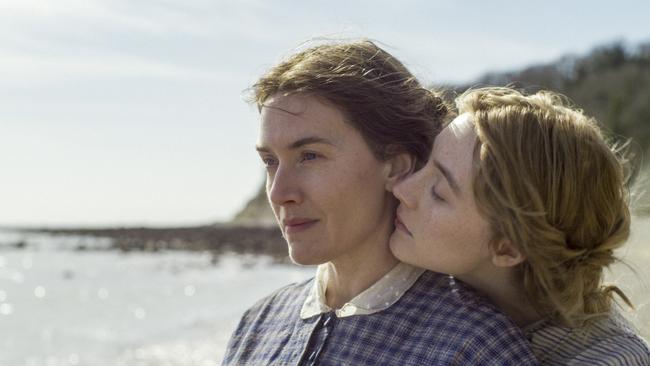
The latest role tackled by the 45-year-old actress, who has said “there’s more to life than cheekbones”, is by contrast utterly devoid of glamour, high adventure or melodrama buffed to a high sheen. In Ammonite, a sombre, slow burn of a film, she plays 19th-century British palaeontologist Mary Anning, who made historically significant fossil finds on England’s exposed Lyme Regis coast, despite her limited education and hardscrabble working-class background. Almost despite herself, this flinty loner falls in love with a young, married woman of a different social class, Charlotte Murchison (Saoirse Ronan), who is dealing with a recent emotional trauma. Winslet’s Anning has a thick Dorset accent, while her hair is drawn back in a severe Queen Victoria style. We see her hauling herself up the cliffs on a wind-lashed strip of coast, turning over heavy boulders, peeing on the pebbly beach, scrubbing her “relics” by faltering candle light. As the film opens, she is unsmiling, unapproachable, taciturn — it’s clear her unforgiving existence, with her father and eight of her siblings dying before she reached adulthood, has worn away her softer edges, just as the churning brown sea erodes the bleak coastline where she makes her living.
What drew Winslet to the role of Anning, a woman who, the actress contends, “didn’t know how to be loved”? “I loved the script,” she replies. “I read the script and I found it quite unlike anything I had done before, tonally … I just found this character to be stoic, quiet, formidable, incredibly resourceful, self-sufficient.”
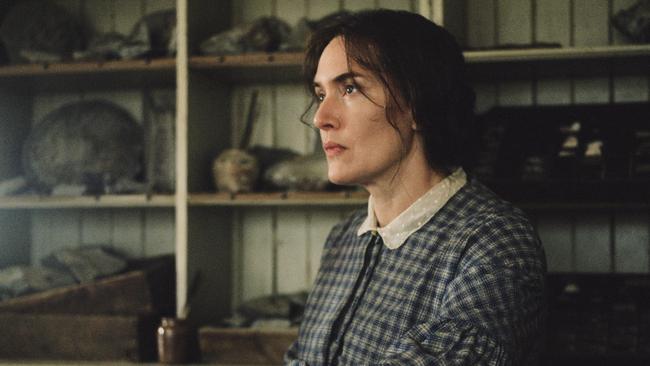
The film, with British writer-director Francis Lee at the helm, “is an imagined snapshot of Mary Anning’s life; it isn’t a bio-pic”, says Winslet. While the lesbian affair is central to the film, Winslet agrees “there is no historical documentation to suggest Mary Anning had a relationship with a man or with a woman”, though she did know Murchison. Winslet has read Anning’s journals, “and she talks in one entry about a treachery, terrible betrayal, and literally you turn the page and the next page is missing.
“It was absolute agony — I was trying desperately to figure out whether this was treachery in a relationship or whether it was something to do with her work — there was no way to really know.”
Winslet and Ronan perform a relatively explicit sex scene in Ammonite and, intriguingly, the way it was filmed caused Winslet to reappraise earlier sex scenes she has done. “It did feel very different,” she muses. “I’ve played LGBTQ characters before. In fact, I played an LGBTQ character in the first film I ever did, Heavenly Creatures.”
That 1994 film, directed by Peter Jackson and set in New Zealand, was about an obsessive relationship between two adolescent girls that ends in murder. “Back in those days I didn’t have the confidence I have now as a person,” recalls Winslet. “I was very young, I had only just turned 17 actually and also I had very little experience of actual intimacy in my own life, so I didn’t really know what I was doing, other than playing the character.”
This time around, having since performed many heterosexual love scenes, “what I realised is that because it was Saoirse and I together, two women together, we therefore automatically speak the same physical language, and that made a really big difference”.
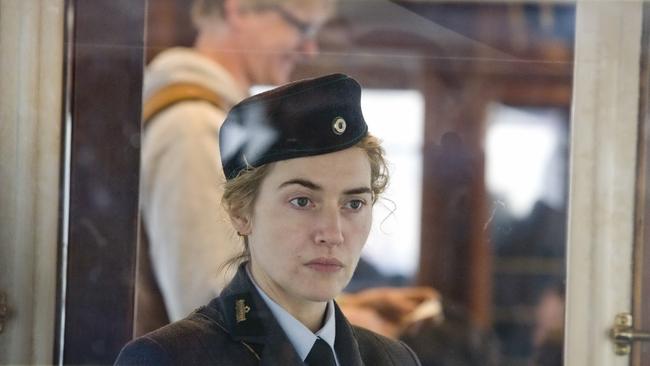
She and Ronan, the Irish-American actress who has starred in Brooklyn and Lady Bird, planned the scene’s “content”, with Lee “very present in the room”: “It just felt like a breath of fresh air. It just felt very safe and very joyful and very connected in ways that I perhaps haven’t necessarily always felt in the past. Not to say that I have ever felt forced to do anything I didn’t want to do, because that’s truly not the case. I always do feel I’ve been able to hold my own, be respected, set the boundaries, all of that good stuff.
“But it’s a very interesting thing when you remove heterosexual stereotypes. I just learned a lot (in Ammonite) about how we as actors, filmmakers and writers — the objectification of women is something we still need to really work on because it’s so often built into the narrative without us even noticing.”
She is known to be forthright and earthy — she said recently that as the pandemic restricted international travel, she loved “not getting into those f..king dresses and those f..king shoes” for press junkets, which she considered a “colossal” waste of money. So it comes as a surprise to learn she has approached previous sex scenes with a kind of passive acceptance of the script’s requirements.
“For me, it’s become quite automatic to just participate in heterosexual love scenes and to accept the wording of a certain scene,” she reveals. She gives the example of a screenwriter describing a sexual moment — “she climbs on top; dominating now, taking over”.
This, she says, is “a very broad description of the woman as a character … Why can’t she just know what she wanted in that moment? Why can’t it just be passionate?”
The “equal connection” depicted in Ammonite, she concludes, “just really brought up a lot of stuff for me”.
In the film’s promotional material, Winslet says “we are seeing a new chapter in the history of women: it started with #MeToo”. Does she feel things are changing significantly for women in film? She replies: “I think we’re seeing much more equality and inclusivity on film sets in terms of crew, in terms of casting. I think that we are hearing women’s voices … what we want to say and the stories we have to tell are being received differently.”
The tendency to write out of history the achievements of women such as Anning was also changing “and I feel very excited about that because I truly, truly hope and believe that this next generation of women — young women who are my daughter’s age, the 20s to 30s — they are gonna change the world.” (Her daughter, Mia Threapleton, also has embarked on an acting career and has starred this year in the post-apocalyptic thriller Shadows.)
She continues: “We’re creating space for those people to have courage and to speak for themselves.” However, she says that speaking publicly about a change of heart, as she did recently, can result in “shithouse” responses from detractors. Here Winslet casts off the relatively cautious, reflective persona that has driven the interview so far: “Because of the (#MeToo) movement … I think that in time people will speak with a good deal more compassion than perhaps we have done before, and I think the sort of finger pointing of people will start to change.
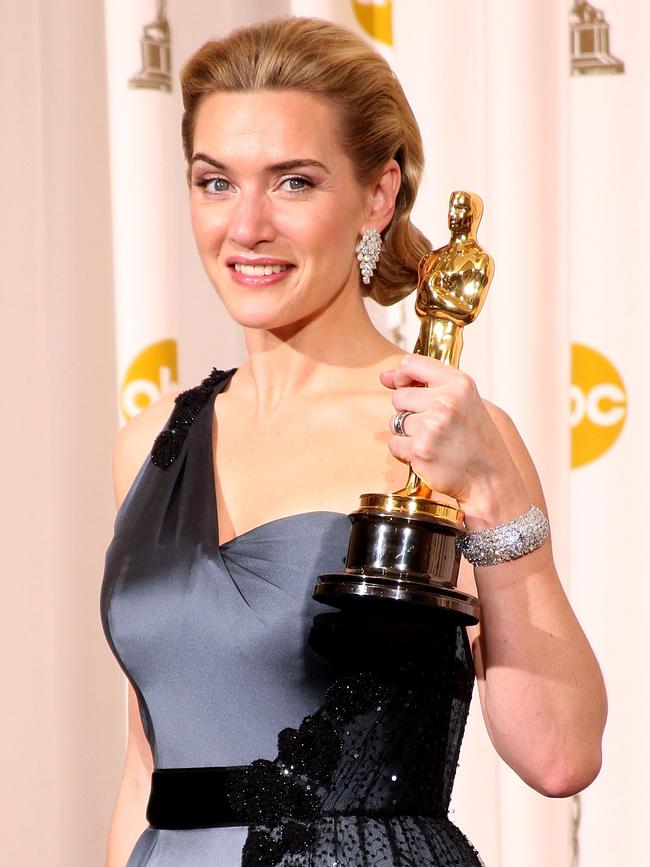
“For example, so often someone might say publicly, ‘Oh I’ve changed my mind about that’ … It’s very easy to turn to that person — and it happens a lot — and say, ‘Well, you can’t say that because you did this’ or ‘that’s not what you said 10 years ago’.
“Well, that’s like saying to a vegan, ‘Sorry you can’t be a vegan because you spent 10 years eating hamburgers.’ It’s a shithouse way of thinking.”
She is referring to the wave of sharply negative commentary that followed her telling Vanity Fair in September she regretted working with directors Roman Polanski (on his 2011 film Carnage) and Woody Allen (on 2017’s Wonder Wheel). Allen has been accused of sexually abusing his adoptive daughter Dylan, though he strenuously denies the allegations and has never been charged. Polanski pleaded guilty to raping a 13-year-old girl in 1977 in the US but has gone on to be lionised by the Hollywood and European film establishments.
“It’s like, what the f..k was I doing working with Woody Allen and Roman Polanski?” Winslet declared to Vanity Fair, adding: “It’s unbelievable to me now how those men were held in such high regard, so widely in the film industry and for as long as they were.”
On social and in mainstream media, Winslet was accused of hypocrisy, of “growing a conscience belatedly”, of being a “soulless opportunist”, while Allen’s defenders said she was playing “the virtue game in retrospect”.
While promoting Wonder Wheel in 2017, Winslet told The New York Times: “As the actor in the film, you just have to step away (from the abuse allegations) and say, ‘I don’t know anything really and whether any of it is true or false.” She added: “Woody Allen is an incredible director. So is Roman Polanski. I had an extraordinary working experience with both of those men.”
I ask whether, at that time, she regarded Allen’s and Polanski’s work lives as being separate from their personal lives and behaviour: “Well, people in Hollywood behaved as such,” she replies. “People were signing up to work with these men. People were queuing up. People were winning awards for working with these men. People were raving about the experiences of working with these men and so therefore the message that Hollywood was giving — and I defy anyone to deny this — everybody wanted to work with those people, and still do, and still do, OK?
“So we were all told it was OK and I feel so frustrated with myself now. But I have to grapple with that frustration. I have to process the regret and it just felt timely to just say, ‘You know what, I shouldn’t have done that,’ and I wanted to do it with a bit of integrity and just move on and make appropriate choices from now on and not ones that leave a really bad taste in my mouth.”
Having come to worldwide notice in Titanic, Winslet plunged back into the water — literally — when she reunited with notoriously exacting director James Cameron to make Avatar 2. It’s the long-awaited sequel to 2009’s Avatar which, like Cameron’s Titanic, broke global box-office records. She is playing the “pivotal role” of Ronal, a free diver, and for this part she learned to hold her breath under water for an Olympian seven minutes. “Seven minutes and 14 seconds,” she corrects me, chuckling. “Working on those films was amazing.”
She filmed her underwater work in 2018 and says “it was just a terrific experience, you know just wonderful technicians and artists and performers and the way of working is so methodical and safe … Yes, I had to train how to breath hold and free dive and it was wonderful. It was at one of my training sessions that I held my breath for seven minutes and 14 seconds. Crazy. And I loved it … It was very sort of meditative and calming.”
The much-delayed blockbuster is set for release in December 2022 and Winslet says of working with Cameron: “He’s just such a filmmaking genius and his process has evolved considerably over the years. He’s just learnt how to be very considerate of what everyone has to bring to the table, and he was wonderful with the younger actors, it was so good to see how comfortable they all felt and to watch their confidence grow.”
Winslet performed the title role in HBO drama Mildred Pierce in 2011, and she will soon appear on the cable network again, playing the lead character in drama series Mare of Easttown, about a small-town detective who investigates a murder while her home life implodes. It’s due for release this year and Australian rising star Angourie Rice plays Winslet’s headstrong daughter.
In the meantime she has become an advocate not only for Ammonite but also for its under-appreciated heroine, Anning, whose finds are still housed in leading institutions, including London’s Natural History Museum, but who was denied the credit she deserved during her lifetime.
Winslet admits that until she played her, “I didn’t know very much about her, actually, like most people. Most people don’t know anything about Mary Anning because she was a woman and her work and her discoveries were reappropriated by men who bought her finds and put their names on her work and actually disputed a lot of her scientific discoveries.” According to the BBC, Anning was just 12 when she “discovered a 5.2m (17ft) skeleton, now known to be an ichthyosaur … She also unearthed the UK’s first known remains of a pterosaur, believed to be the largest-ever flying animal.”
The actress says that through their romance, Ammonite’s female characters gain as many insights into their own psyches as they do about each other: “A love story can so often be about two people coming together and the flirtation, the dance of that, and a foregone conclusion — a happy ending. For me, Ammonite is about two people who discover more about themselves, almost, than each other through this connection that they form.”
Although the film is set in the 1840s, Anning and Murchison’s affair is not treated as a scandal or secret — and Winslet says she “truly loved” this approach. “It’s a love story between two people, and the fact that they are two women is never acknowledged or addressed in such a specific way or explained. I really admired Francis for doing that because that for me is precisely how more LGBTQ films will slip into the mainstream, and that is what I think we need and want in the world.”
Ammonite is in cinemas from January 14.

